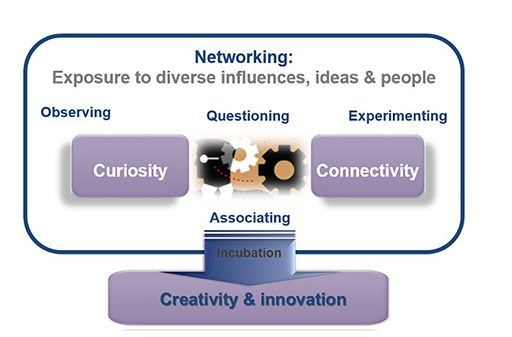3.2 Discovery skills
You may already have an idea for a new venture, or you may be considering your options. Either way, thinking about the source of an idea can help assess your existing ideas or even help to develop new ones. Remember, your idea may just be a starting point and you should be alert to many more that will occur to you as the course unfolds. These new ideas will also require evaluation to select the best options for you.
Ideas from nowhere are exceedingly rare. Most come from experiences, positive and negative, and they may not actually register with you unless you are alert to them. Life provides numerous opportunities and experiences to learn from but it is the extent to which you care about them that provides the impetus to act. Figure 2 and the table below summarise the type of discovery skills that lead to creativity and innovation.
| Observing | actively noticing, watching, listening, perceiving, experiencing something |
| Questioning | asking relevant questions |
| Curiosity | the behaviour that causes you to ask questions and seek answers to why, how, where, when things happen as they do |
| Connectivity | linking objects, people, concepts, data, ideas etc. to see what results - or in the case of computing linking devices to each other and the internet |
| Associating | making connections between one thing and another - for example possible alternative solutions to a problem; possible ways to satisfy a need or want |
| Incubation | the process of developing ideas or solutions to a point where they have form |
| Creativity and innovation | the production of a new idea, solution, product, service or business which may be new to the world, an improvement on something, or provides access to a new market. |
Later in the course you will return to these skills in practical activities. Next, you will read about a famous example of an innovator and an entrepreneur.

